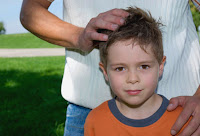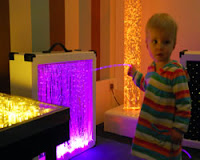"My 6 year old son has just been diagnosed with Asperger’s, and I’d like to know what to tell friends, neighbours, teachers, and extended family to help them understand his behaviour."

Asperger’s was first noticed in 1944, and it was first seen in children that had been diagnosed with autistic personality disorder. A researcher by the name of Asperger worked with children and saw that they exhibited delays in social maturity, social reasoning, and social abilities. He found verbal- and non-verbal impairments in communication, especially when the children attempted to converse. Asperger also observed that the children had difficulties controlling emotions, but they could intellectualize their feelings.
Further research by Asperger found that the children became preoccupied with various interests and these would dominate their thought processes. Asperger also found that some of the children were having learning problems, difficulty with coordination, and that they exhibited a marked sensitivity to certain smells, sounds, and textures.
You can start sharing information by giving friends and relatives an introduction to Asperger’s using the above paragraphs. This will provide them with some history and context. Sharing information on any illness or diagnosis requires tact and discretion. You might want to tell the people in your life on a “need-to-know” basis.
It is very important to stress that a diagnosis of Asperger’s does not make your child “weird” or inferior. Make sure you stress the positive elements that can be found in people with Asperger’s. There are actors, authors, researchers, and scientists who have been diagnosed with Asperger’s, and they have achieved seemingly insurmountable life goals. When your friends and relatives are aware of these facts, it will help dispel the mystery and confusion that surrounds Asperger’s.
When you discuss Asperger’s with children, you can use classroom materials that have been developed to assist children in understanding this diagnosis. Look for a local group that helps people and their relatives cope with Asperger’s.
After you have shared some of the above information, ask the people you are talking with if they have any questions or concerns about anything that you have discussed. Let them know that any question or concern they may have is valid, and you are not going to be offended by their inquiries. Not only will this ease communications, it will prove you to be a mature, open-minded individual who loves your child and cares about friends and family.
The Parenting Aspergers Resource Guide: A Complete Resource Guide For Parents Who Have Children Diagnosed With Aspergers Syndrome
COMMENTS:
• Anonymous said... I'm having the same issue but with Boy Scouts.
• Anonymous said... in school give the diagnosis to the head diagnostician and fight for everything you can get. Get involved in Apsie mom support groups and maybe even take an advocate with you to help walk you through the process. I typically don't say anything until I get a look or mostly they ask. I figure why introduce him with a label. and when they do I just tell them right out, he has aspergers so he has issues with social skills. Mostly that is all you have to say if they want to know more tell them. and yes, look me in the eye when I am talking to you is a GREAT book to read and pass along to friends and family members.
• Anonymous said... Look Me in the Eye by John Elder Robinson is a great book to buy and loan out to friends and family. It is an autobiography by an "Aspie". Be sure to meet with the school and get an IEP. Good luck,
• Anonymous said... Once my son was diagnosed I was able to understand him better which then made me handle situations better. If I think anything is going to upset him I remove him from the situation or we just don't do it. I've learned to "read" him and his actions in a way. I don't feel the need to explain his behavior. Close family, friends and the school know. His teacher, resource teacher and school counselor discussed him and his behaviors prior to school starting. We also met with his teacher the day before school started and discussed ours and his concerns. His teacher and I are in close email contact. I also have a autism tattoo on my fore arm that seems to strike up a lot of conversation in public. I don't want him to be "labeled" he struggles enough without a label.
• Anonymous said... Professor Tony Attwood is a clinical psychologist known world wide for his knowledge of Aspergers Syndrome.
• Anonymous said... The first instinct is a preventative strike to prep people for the "not average" social challenges presented by our children. But at the same time labeling before someone gets to know your son could be used improperly by well meaning but uninformed people. The fine line when to notify and when not to should be crossed when an adult will have behavior judgments over your child. Teachers, club leaders etc. They need to know that Aspergers is not a behavior problem but a problem interpreting external stimuli. Their intervention for young children living with Aspergers to help them cope with change and discomforts is what we need for our kids. If someone accidentally began assigning punitive measures for responses that are not the child's choice would be harmful.
Post your comment below…















